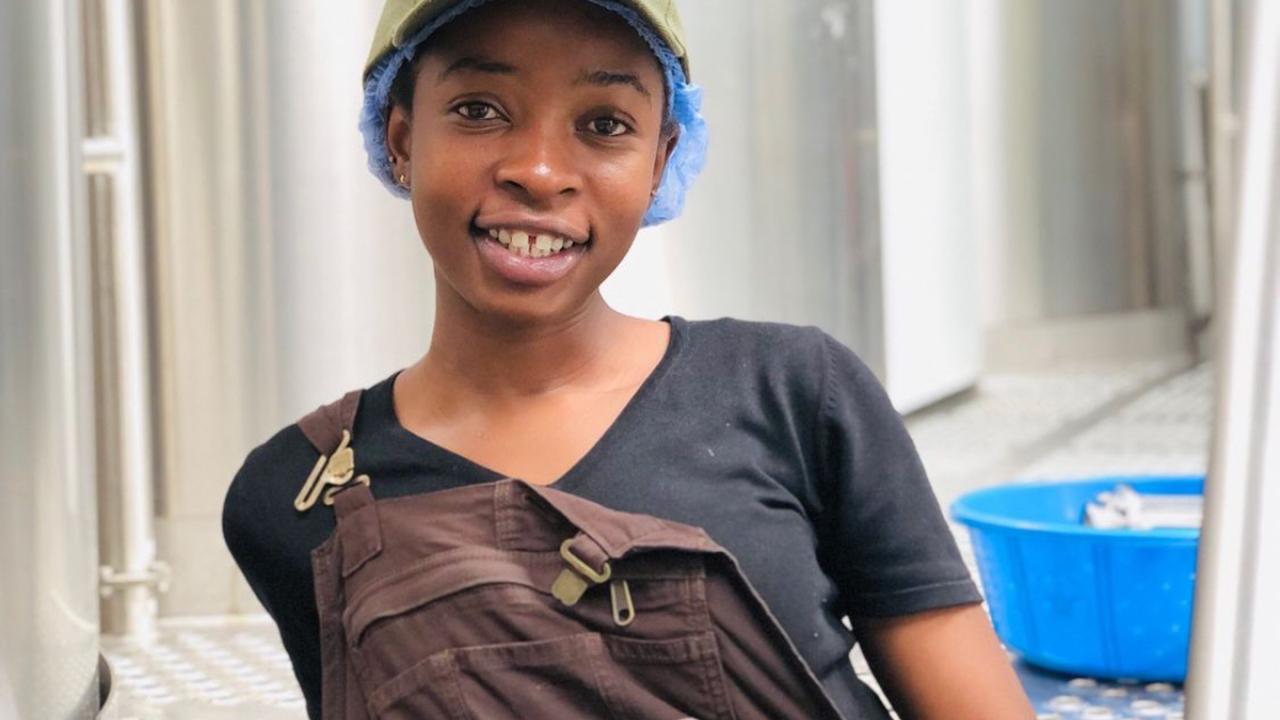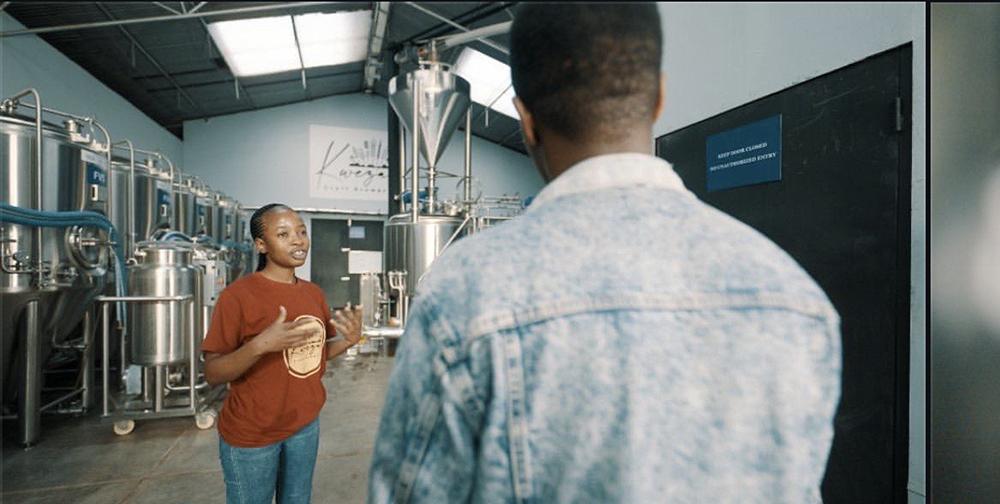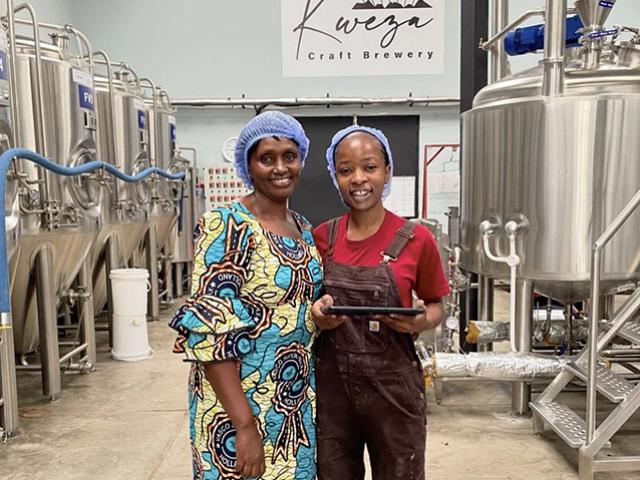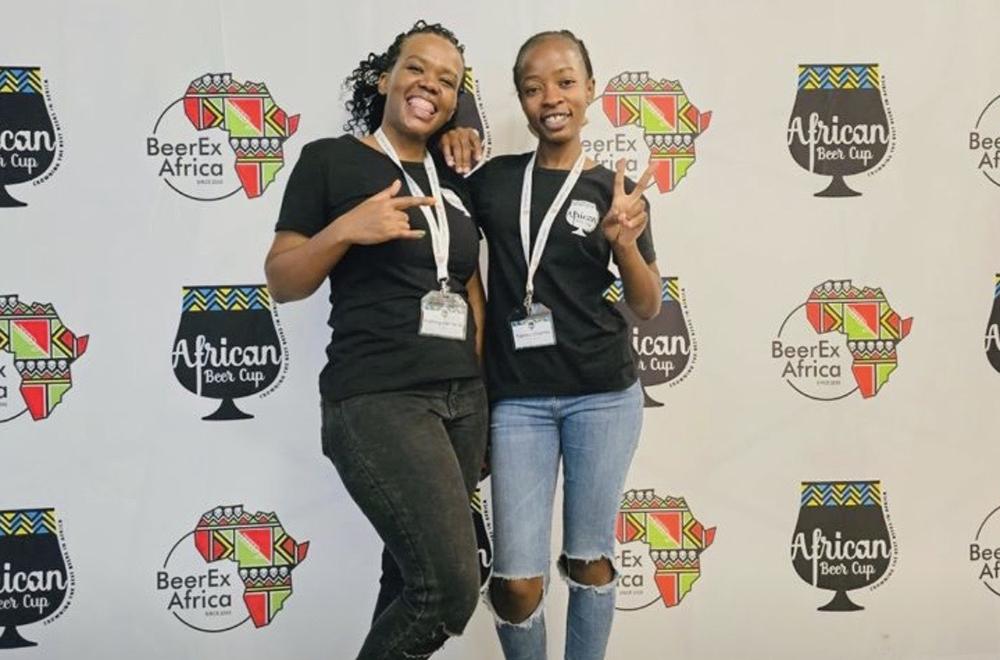
A New Voice in Brewing: Tapiwa Charosa’s Vision for the Industry
“Brewing has become my passion and my calling, combining science, artistry and connection in every glass,” said Tapiwa Charosa, winner of the 2025 UC Davis Tapping Potential Scholarship, which provides tuition to attend the online Master Brewers Certificate Program.
For Tapiwa, choosing to pursue a career in brewing had its share of challenges. “Brewing roles were scarce in my country, especially for women,” said Tapiwa, a native of Zimbabwe with a degree in food science and technology. “With no formal brewing schools in Africa, I took it upon myself to gain the knowledge needed to pursue this passion.” After completing online coursework from the Institute of Brewing and Distilling, she got her big break, but one that came at a cost.
“I made the difficult decision to leave my life behind and move to Rwanda,” said Tapiwa, who couldn’t pass up the opportunity to join the country’s first and only women-led craft brewery. Today, Tapiwa is an assistant brewer at Kweza Craft Brewery in Kigali, Rwanda.
With her foot in the door and a scholarship in hand, Tapiwa has a pathway, and she’s looking to make waves in the brewing industry. “My goal is to bring new voices into brewing,” she says. “The UC Davis Master Brewers Certificate Program will enable me to refine my technical skills and bring a high level of expertise back to the African brewing community. It will put me in the position to promote a more inclusive, innovative and globally representative industry.”

When did your passion for brewing begin?
My journey into brewing began during a course on fermentation. I went in expecting a deep dive into fermentation processes, but it quickly became so much more. As we explored how yeast transforms simple ingredients into rich, flavorful beer, I was completely captivated.
My interest deepened when I joined Kweza. We craft recipes, ensure quality and build processes, all while creating a product that connects with culture and community. This confirmed that brewing is more than just technique to me—it’s creating memorable experiences and bringing people together.
The hands-on experience is nothing short of exhilarating. Working here feels like stepping into a workshop where each batch is an experiment in taste and technique. From malting sorghum to selecting hops and yeasts to balancing flavors, every step in the brewing process is a chance to refine, innovate and enjoy.
From that initial fermentation course to my hands-on role, brewing has become my passion.
What have been some of your most rewarding moments working at Kweza?
Being part of a pioneering team that champions female leadership in the craft beer industry has been incredibly fulfilling. One of the most rewarding moments was assisting in the successful commissioning of the brewery from pilot scale, which marked a significant milestone in its journey. Seeing customers appreciate the unique flavors we craft with majority local ingredients and witnessing the brewery's positive impact on representation in the industry, have also been inspiring.
Dive into the African Brewing Scene
Opaque beer is traditionally homebrewed across Africa. It is murky, creamy and has a thin porridge-like consistency with visible particles. No hops are added to opaque beer. There are a couple of commercial breweries in Southern Africa. The most known brand is Chibuku which has several manufacturing plants in Zimbabwe, South Africa, Zambia, Malawi and Botswana.
Clear beer is transparent, bright and usually filtered or clarified to remove any haze. It is usually crisp and clean (in the form of lagers and ales) and mostly commercially brewed with malted barley, adjuncts like maize and rice hops, as well as yeast.
Tell me about the brewing scene in Rwanda and Zimbabwe. What styles and brewing traditions are popular?
The brewing scene in Rwanda is emerging, with a growing appreciation for craft beer alongside the mainstream beer producers. Popular beer styles in Rwanda include lighter, approachable ales and lagers that cater to a wider audience. Kweza makes a wider range of beer styles including sours and saisons. Kweza’s beers celebrate Rwandan culture and ingredients with all grain-based beers being brewed with majority sorghum.
Zimbabwe’s brewing industry is more established, with a few large-scale opaque beer breweries (a beer made of malted sorghum and maize) and one large-scale clear beer manufacturer (lagers and ales) with several breweries producing opaque and clear beers. The craft beer movement is slowly gaining traction, with a few microbreweries beginning to emerge, offering a variety of styles that appeal to a niche market. Popular beers in Zimbabwe include traditional lagers, pilsners and opaque beers.
What does diversity in the brewing industry mean to you and why is it important?
To me, diversity in the brewing industry means creating an inclusive space where people from all backgrounds have opportunities to contribute, lead and innovate. It’s about breaking stereotypes and ensuring that the industry reflects the diversity of the communities it serves.
Empowering women in brewing is especially important to me. Historically, women have played a significant role in brewing, particularly in the traditional context. Yet, modern brewing has often been male-orientated, limiting women's representation in leadership and technical roles.
Working at Kweza Craft Brewery, I’ve witnessed firsthand how empowering women in brewing can inspire others and reshape industry narratives. Diversity is important because it ensures equity and representation, allowing underrepresented groups to have a voice and a platform. By prioritizing diversity, the brewing industry can evolve into a more vibrant space for everyone.

From your perspective, what are some of the biggest barriers faced by underrepresented populations in the brewing industry today?
One of the primary challenges is access to education and training, as brewing often requires technical expertise that can be expensive and inaccessible, particularly in places such as Africa with no specialist brewing schools or programs.
The lack of representation in leadership positions is also a big barrier, as the absence of visible role models makes it harder for individuals to envision their potential within the industry.
What does winning the Tapping Potential Scholarship mean to you?
It validates my passion for brewing and my commitment to making a difference in the industry. It inspires me to continue breaking barriers and pursuing my goals with confidence.
Winning this scholarship is a transformative opportunity to expand my knowledge and connect with industry leaders at UC Davis. It equips me with the knowledge and resources to drive innovation and create meaningful change in the brewing world, making it more inclusive and representative.
The scholarship aligns perfectly with my vision of fostering diversity in brewing. At Kweza I work closely with female sorghum farmers, emphasizing sustainable practices and empowering local women throughout our production chain. With advanced training, I’ll be equipped to extend this impact, helping create more educational pathways for women and underrepresented groups across Africa. By completing the Master Brewers Program, I aim to establish training initiatives and mentorship programs for aspiring brewers who may lack access to formal education. This scholarship is a steppingstone to realizing that vision, amplifying my ability to champion diversity and share this unique expertise in my community.
What specific skills are you excited to develop through the program?
Sensory analysis and brewery engineering

How will the Master Brewers Certificate Program help you achieve your goals?
One of my goals is to be a master brewer. The brewing program will help me deepen my understanding of brewing science and enhance my technical skills. Beyond technical proficiency, the program will enable me to take on leadership roles in the brewing industry, where I aim to champion underrepresented groups.
My long-term goal is to lead innovative projects that combine technical excellence with crafting beers that have unique flavors inspired by African traditions, celebrate heritage and resonate with diverse communities. One day, I want to establish a brewery in Zimbabwe that serves as a hub for education, creativity and inclusivity, while encouraging a collaborative and welcoming environment for underrepresented groups.
I can use my platform to break down barriers that limit participation in brewing, particularly for women, and create pathways for underrepresented individuals to enter the brewing industry.
How do you plan to use your brewing education and experiences to break down barriers and in the industry?
Through education, I will gain advanced technical expertise that will put me in a global spotlight and a position to be a role model for minorities. I will be at the forefront of creating a brewing industry that is not only innovative but also reflective of the diversity of the communities it serves.
What message do you have for others who may be struggling to break into the industry?
Your journey matters and your voice has a place in this industry. My journey shows that with determination and courage, you can carve your path, challenge norms and inspire change. The brewing industry is evolving, and your presence can shape its future.
For more information on UC Davis Tapping Potential or how to support the campaign, contact John O'Neill.
